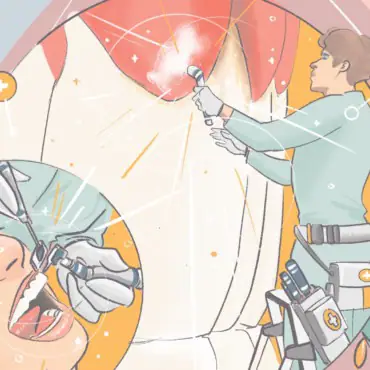So if you’re on the fence or don’t understand why you should have your wisdom teeth removed, you’re not alone. Lots of people figure it’s not worth the pain, not to mention the price. But the longer you put off booking a dentist’s appointment, the more problems your wisdom teeth can cause, costing you more money in the future. So if your wisdom teeth are hurting you, it’s in your best interest to find a dentist to take care of them as soon as possible. Wisdom teeth removal cost can be a big deciding factor, so let’s break it down.
Your wisdom teeth, a.k.a third molars, emerge later than the rest of your teeth, usually between the ages of 17 to 21. Since the rest of your teeth are already formed by then, wisdom teeth can often come out sideways or incomplete. Sometimes they’re trapped in the gums because there simply isn’t enough room for them. This can cause tooth pain, infections, crowding, and swelling. If you’re experiencing any of these symptoms, your dentist will recommend you get them taken out ASAP.
How much does wisdom teeth removal cost?
The exact wisdom teeth removal cost will depend on a couple factors, like your dentist’s location and how difficult your teeth are to extract. If you’re getting an oral surgeon to extract a wisdom tooth that hasn’t emerged yet, that will also cost you more than if you get your own dentist to perform the extraction.
Overall, the cost of wisdom tooth removal can range from $150 to $500. We’ll dive into the different types of extractions and how they vary in price. Keep in mind these charges are for the procedure alone; the cost of sedatives, dental exams, X-rays, or other equipment used will cost you extra.
Exposed teeth
Wisdom teeth that have already grown in are the easiest and cheapest to remove. (Yay!) That’s because the teeth have grown past the gum and are clearly visible, taking much less effort to extract. Although you should always search for the most reputable dentist within your budget, wisdom teeth that have grown in rarely have complications.
On average, this procedure will cost you around $300 for each tooth. If you’re lucky, you may find a good deal for as low as $200. If a dentist asks for more than $700 for emerged wisdom teeth, they’re overcharging you regardless of their qualifications. Oral surgeons may have higher rates, but you don’t need a surgeon to conduct such a simple extraction.
Impacted under soft tissue
Impacted tooth removal is a more complex procedure than an erupted tooth extraction, so it costs a bit more. On average, this type of extraction procedure will cost you around $350. However, rates vary across the US, ranging from $250 to $850. Remember, just because a clinic charges more doesn’t mean they offer better services.
Your tooth will either be impacted under soft tissue, which is a lesser concern, or partially impacted in the bone, which is a bigger issue. A patient with a wisdom tooth impacted under soft tissue will experience pain and swelling in the jawbone and face. In such cases, you should get an extraction as soon as possible. This type of dental issue can worsen quickly. With impacted tooth removal, the dentist will make an incision in the tissue, and you will need stitches.
Due for a checkup?
Find a top rated dentist near you that takes your insurance.
The specific treatment varies depending on how severe the impaction is. For a higher level of trauma, the dentist will use a non-dissolvable stitch. But, for lesser damage, they’ll use a dissolvable stitch. In the first scenario, you will need a repeat visit to the clinic. If your dentist says you have an impacted wisdom tooth in your initial visit, ask them if they think you’ll need stitches, what kind of stitches they plan to use, and whether there are extra charges for the second sitting.
Impacted, partially bony
In this case, the impacted wisdom tooth is partially above the gum line, while much of the tooth is encased in the bone. This is a more intense oral surgery than the first two so, naturally, it will cost more. Not only does it require a greater level of expertise from your dentist, but it also calls for more equipment. Since the dentist or oral surgeon will need to make an incision in your gum and bone, you’ll need to be sedated longer. The clinic will likely charge you for the anesthesia in 15-minute segments. How long the procedure takes depends on the difficulty of the surgical extraction.
Fortunately, while the incision in the bone will make you feel pressure, local anesthesia will be numbing the area so you’ll be pain-free. This type of wisdom teeth removal cost is around $450 per tooth. While you can find professionals to do it for as low as $300, partially bony impacted extraction is a tricky procedure, so don’t compromise on quality. The maximum charge for this type of wisdom tooth extraction is $950.
Impacted, fully bony
The final and most complex type of wisdom tooth extraction is a fully bony impacted tooth. If you’re unlucky enough to have this condition, it means your wisdom tooth is wholly stuck under your gum tissue and in your jaw. This kind of impacted tooth needs to be removed immediately.
The average cost for this procedure is $550, while the lowest quote you might find is around $350. It shouldn’t cost you more than $1100. The high cost corresponds to the difficulty level of the extraction. You will need a highly qualified expert for a fully bony extraction.
The dentist will have to make a cut in your gums and the bone covering your wisdom tooth. Additionally, they may have to cut the tooth into tiny pieces to remove it. When the tooth is cut up, it reduces the need to make bigger cuts, so your jaw will heal quicker afterward. You may want to consider going to an oral surgeon for this procedure. You will also need to be fully sedated during this extraction, so consider the price of general anesthesia.
The actual cost of your extraction will vary on a case-by-case basis. Remember, you’ll also need a dental exam before your extraction, which will cost $80 to $100. When estimating your costs, add around $300 to $350 to account for the exam, panoramic X-rays, general or local anesthetic, and nitrous oxide (laughing gas). Also remember to ask your dentist about the healing process. He or she can tell you all about the blood clots that will form and how to prevent dry socket. That way, you can avoid extra trips to the clinic.
Does insurance cover wisdom teeth removal?
The total cost of an out-of-pocket wisdom tooth removal can easily add up to $1000. And that’s just for one tooth. Add to that the fact you’ll probably need multiple teeth extracted, and it’s an extravagant expense. Getting wisdom teeth removed without insurance isn’t an affordable option for most people.
Thankfully, all dental insurance plans and most medical insurance plans cover wisdom tooth removal. Insurance generally covers around 80 percent of the cost for extraction. However, if you plan on relying on your insurance company, you’ll need to look into the annual limit for your plan.
Depending on what type of insurance you have, a single extraction may push you to the yearly maximum. Then if you need multiple removals, you’ll have to space them out over months or years. A better alternative is to use a dental discount plan. You can use these payment plans independently or combine them with your insurance plan to reduce dental treatment rates. They cover medical and cosmetic treatments, and in exchange, you pay a yearly or monthly fee.
Is wisdom tooth removal worth it?
Considering the pain and expense that comes with a wisdom tooth removal, it’s totally fair to ask if it’s really worth it. The answer in most cases is yes. These extra teeth exert pressure on the surrounding teeth and gums, causing shifting and misalignment. Not only does this cause pain, but it can also lead to bite irregularities.
Sign up for our newsletter.
Just let us know a bit about yourself.
Impacted wisdom teeth can also expand the jaw, cause sinus congestion, and lead to cavities and bone loss. Ultimately, only your dentist can tell you if you absolutely need to get your wisdom teeth removed. The out-of-pocket wisdom teeth removal cost can also be reduced by dental insurance.
Where can I find a dentist for wisdom tooth removal?
Finding a dentist can be stressful. Searching for clinics in your area means spending hours researching and comparing dental offices. But when you have an urgent oral health issue that needs to be dealt with, you can’t afford to waste time.
At Opencare, we’ve spent thousands of hours vetting dentists so you don’t have to. With over 800 top-rated dentists in the US and Canada, you can easily find and book an appointment with a dentist that’s perfect for you. Take the quiz to help us understand what matters most to you, and we’ll match you with the best clinic for your dental care needs.
Due for a checkup?
Find a top rated dentist near you that takes your insurance.








